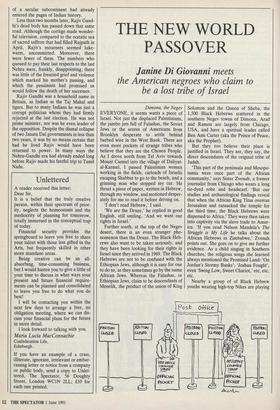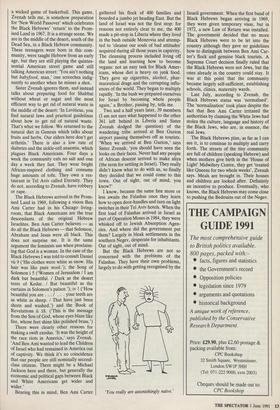THE NEW WORLD PASSOVER
Janine Di Giovanni meets
the American negroes who claim to be a lost tribe of Israel
Dimona, the Negev EVERYONE, it seems wants a piece of Israel. Not just the displaced Palestinians, the jumbo jets full of Falashas, the Soviet Jews or the scores of Americans from Brooklyn desperate to settle behind barbed wire in the West Bank. There are even more pockets of strange tribes who believe that they are the Chosen People. As I drove north from Tel Aviv towards Mount Carmel into the village of Daliyat- al-Karmel, I passed Palestinian women working in the fields, carloads of Israelis escaping Shabbat to go to the beach, and a grinning man who stopped my car. He thrust a piece of paper, written in Hebrew, through my window, and motioned desper- ately for me to read it before driving on.
'I don't read Hebrew,' I said.
'We are the Druze,' he replied in good English, still smiling. 'And we want our rights in Israel.'
Further south, at the top of the Negev desert, there is an even stranger phe- nomenon than the Druze. The Black Heb- rews also want to be taken seriously, and they have been looking for their rights in Israel since they arrived in 1969. The Black Hebrews are not to be confused with the Ethiopian Jews, although it is easy for one to do so, as they sometimes go by the name African Jews. Whereas the Falashas, or Ethiopian Jews, claim to be descendants of Menelik, the product of the union of King Solomon and the Queen of Sheba, the 1,500 Black Hebrews scattered in the southern Negev towns of Dimona, Arad and Ramon are largely from Chicago, USA, and have a spiritual leader called Ben Ami Carter (aka the Prince of Peace, aka the Prophet).
But they too believe their place is justified in Israel. They are, they say, the direct descendants of the original tribe of Judah.
`This part of the peninsula and Mesopo- tamia were once part of the African community,' says Sister Zvenah, a former journalist from Chicago who wears a long tie-dyed robe and headscarf. 'But our studies and archaeological findings reveal that when the African King Titus overran Jerusalem and ransacked the temple for the third time, the Black Hebrews were dispersed to Africa.' They were then taken into captivity via the slave trade to Amer- ica. 'If you read Nelson Mandela's The Struggle is My Life he talks about the African Hebrews in Zimbabwe,' Zvenah points out. She goes on to give me further evidence. As a child singing in Southern churches, the religious songs she learned always mentioned the Promised Land: 'On Jordan's Stormy Banks'; 'Joshua Fought', even 'Swing Low, Sweet Chariot,' etc, etc, etc.
Nearby a group of of Black Hebrew youths wearing high-top Nikes are playing a wicked game of basketball. This game, Zvenah tells me, is somehow preparation for 'New World Passover' which celebrates the Black Hebrews' return' to the Prom- ised Land in 1967. It is a strange scene. We are in the middle of the desert, south of the Dead Sea, in a Black Hebrew community. These teenagers were born in this com- munity, were taught Hebrew from an early age, but they are still playing the quintes- sential American street game and still talking American street: `You ain't nothing but babyfood, man,' one screeches indig- nantly to another when he misses a shot.
Sister Zvenah ignores them, and instead talks about preparing food for Shabbat without wheat or sugar and the most efficient way to get rid of natural waste in the middle of the desert: `In Leviticus, you find natural laws and practical guidelines about how to get rid of natural waste. That's what we follow. We returned to the natural diet in Genesis which talks about fruits and herbs. Our elders here don't get arthritis.' There is also a low rate of diabetes and the sickle-cell anaemia, which plagues Black Americans. Four days a week the community eats no salt and one day a week they fast. They wear bright African-inspired clothing and consume huge amounts of tofu. They own a res- taurant in Tel Aviv called Eternity. They do not, according to Zvenah, have robbery or rape.
The Black Hebrews arrived in the Prom- ised Land in 1969, following a vision Ben Ami Carter had in his Chicago living- room, that Black Americans are the true descendants of the original Hebrew Israelites. Ben Ami Carter believes — as do all the Black Hebrews — that Solomon, Abraham and Jesus were all black. This does not surprise me. It is the same argument the feminists use when proclaim- ing that God is a woman. In the case of the Black Hebrews I was told to consult Daniel vii 9 (`His clothes were white as snow. His hair was like pure wool.'); the Song of Solomon i 5 (Women of Jerusalem / I am dark but beautiful. / Dark as the desert tents of Kedar. / But beautiful as the curtains in Solomon's palace.'); iv 1 (`llow beautiful you are . . . / . . . your teeth are as white as sheep. / That have just been shorn and washed.') and the Book of Revelations ii 18. (`This is the message from the Son of God, whose eyes blaze like fire, whose feet shine like polished brass.') There were clearly other reasons for making a swift exodus. 'It was the height of the race riots in America,' says Zvenah. `And Ben Ami wanted to lead the Children of Israel who had remained in America out of captivity. We think it's no coincidence that our people are still nominally second- class citizens. There might be a Michael Jackson here and there, but generally the economic and political gaps between Black and White Americans get wider and wider.'
Bearing this in mind, Ben Ami Carter gathered his flock of 400 families and boarded a jumbo jet heading East. But the land of Israel was not the first stop: for reasons not entirely clear to me, the 400 made a pit-stop in Liberia where they lived in the bush outside Monrovia and attemp- ted to 'cleanse our souls of bad attitudes' acquired during all those years in captivity. The cleansing process included living off the land and learning how to become vegans: not an easy task for Black Amer- icans, whose diet is heavy on junk food. They gave up cigarettes, alcohol, phar- maceutical drugs and the corrupting influ- ences of the world. They began to multiply rapidly. 'In the bush we prepared ourselves for Israel by becoming whole people again,' a Brother, passing by, tells me.
Two and a half years later, 39 members (I am not sure what happened to the other 361 left behind in Liberia and Sister Zvenah dodged the question) of the wandering tribe arrived at Ben Gurion airport passing themselves off as tourists. `When we arrived at Ben Gurion,' says Sister Zvenah, 'you should have seen the looks on their faces. Never had any people of African descent arrived to make aliya (the term for settling in Israel). They really didn't know what to do with us, so finally they decided that we could come to this town. Out of sight, out of mind, you know?'
I know, because the same fate more or less awaits the Falashas once they learn how to open door-handles and turn on light switches in their Tel Aviv hotels. When the first load of Falashas arrived in Israel as part of Operation Moses in 1984, they were whisked off to Jewish Absorption Agen- cies. And where did the government put them? Largely in bleak settlements in the southern Negev, desperate for inhabitants. Out of sight, out of mind.
But the Black Hebrews are not so concerned with the problems of the Falashas. They have their own problems, largely to do with getting recognised by the `You really are astonishingly naive.' Israeli government. When the first band of Black Hebrews began arriving in 1969, they were given temporary visas, but in 1972, a new Law of Return was installed. The government decided that no more Black Hebrews were to be let into the country although they gave no guidelines how to distinguish between Ben Ami Car- ter's flock and genuine black tourists. A Supreme Court decision finally ruled that the Black Hebrews were not Jews, but the ones already in the country could stay. It was at this point that the community became largely self-sufficient, establishing schools, clinics, maternity wards.
Last July, according to Zvenah, the Black Hebrews status was 'normalised'. The 'normalisation' took place despite the fact that Ben Ami Carter irritated the authorities by claiming the White Jews had stolen the culture, language and history of the Black Jews, who are, in essence, the real Jews.
The Black Hebrews plan, as far as I can see it, is to continue to multiply and carry forth. The streets of the tiny community are full of children (speaking Hebrew) and when mothers give birth in the 'House of Light' Midwifery Centre, they get 'treated like Queens for two whole weeks', Zvenah says. Meals are brought in. Their houses and children are looked after. Definitely an incentive to produce. Eventually, who knows, the Black Hebrews may come close to pushing the Bedouins out of the Negev.



















































 Previous page
Previous page